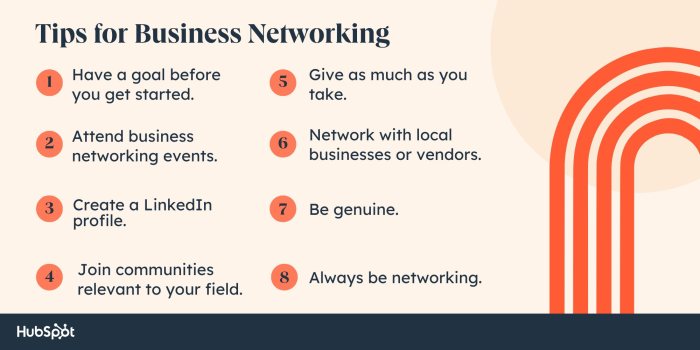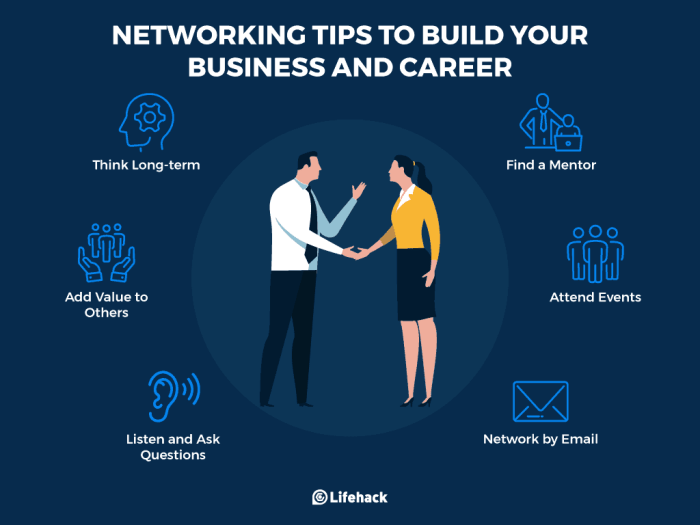Kicking off with Networking Tips for Professionals, this opening paragraph is designed to captivate and engage the readers, setting the tone for high school hip style that unfolds with each word. Networking is not just about making small talk and exchanging business cards; it’s about building authentic relationships that can propel your career to new heights. As professionals, mastering the art of networking is essential for personal growth and professional success. Let’s dive into some key strategies and tips to help you navigate the world of professional networking with confidence and finesse.
Importance of Networking for Professionals

Networking is like the secret sauce for professional growth, ya know? It’s not just about what you know, but who you know that can make a real difference in your career journey. Building connections and relationships can open up a whole new world of opportunities that you might not have even known existed.
Networking Opens Up New Doors, Networking Tips for Professionals
When you network like a boss, you’re not just meeting new people – you’re creating a web of potential collaborators, mentors, and even job leads. Just think about it – that one coffee chat or virtual meetup could lead to your next big career move. It’s all about expanding your circle and keeping those connections alive and kicking.
- Networking can lead to job referrals, recommendations, and even promotions. It’s all about who’s got your back in the professional world.
- Attending industry events, conferences, or even joining online forums can help you meet like-minded professionals who can offer valuable insights and support.
- Successful professionals like Sheryl Sandberg, COO of Facebook, and Richard Branson, founder of the Virgin Group, have attributed a big part of their success to networking like pros.
Building a Strong Professional Network
Building a strong professional network is crucial for career growth and opportunities. It involves connecting with like-minded individuals who can offer support, guidance, and potential collaborations. Here are some tips on how to build a network both online and offline.
Online Networking
- Create a strong LinkedIn profile showcasing your skills and experiences.
- Join professional groups and participate in discussions to expand your online presence.
- Attend virtual networking events and webinars to connect with professionals in your industry.
- Engage with your connections by liking, commenting, and sharing their posts to build relationships.
Offline Networking
- Attend industry conferences, seminars, and workshops to meet professionals face-to-face.
- Join local networking groups or associations related to your field.
- Volunteer for events or projects to showcase your skills and expand your network.
- Exchange business cards and follow up with a personalized email or message after networking events.
Importance of Maintaining Relationships
Building a professional network is not just about making connections, but also about nurturing and maintaining relationships over time. It is essential to stay in touch with your contacts, offer help when needed, and provide value to your network to ensure long-term success.
Strategies for Expanding Your Network
- Ask for referrals from your existing contacts to connect with new professionals.
- Attend industry mixers and social events to meet individuals outside your immediate circle.
- Utilize social media platforms like Twitter and Instagram to engage with a wider audience.
- Offer to mentor or be mentored by someone in your network to foster new connections.
Effective Networking Strategies

Networking at events and conferences is an art that can greatly benefit professionals looking to expand their connections and opportunities. It involves engaging with others in a meaningful way to build mutually beneficial relationships.
Networking at Events and Conferences
- Arrive early to events to have more opportunities to engage with others.
- Come prepared with business cards and a clear elevator pitch about yourself.
- Ask open-ended questions to show genuine interest in others.
- Follow up with new contacts after the event to maintain the connection.
Role of Social Media Platforms
- Utilize platforms like LinkedIn to connect with professionals in your industry.
- Showcase your expertise through regular posts and engagement with others’ content.
- Join relevant groups and participate in online discussions to expand your network.
- Use social media to stay updated on industry trends and events to discuss with new connections.
Making a Lasting Impression
- Listen actively to others and show genuine interest in their experiences and work.
- Offer to help others without expecting immediate returns, building trust in the relationship.
- Follow through on promises made during networking interactions to establish credibility.
- Personalize follow-up messages to show that you value the connection made.
Overcoming Networking Challenges: Networking Tips For Professionals
Networking can be tough, but with the right strategies, you can overcome common obstacles and make meaningful connections in your professional life.
Identifying Common Networking Obstacles
Here are some common networking obstacles and tips on how to overcome them:
- Feeling intimidated by approaching strangers: Remember, everyone is there to network. Start with a simple introduction and focus on finding common ground.
- Lack of confidence in your skills: Remind yourself of your accomplishments and strengths before networking events. Practice your elevator pitch to boost your confidence.
- Not knowing how to follow up: Send a quick email or connect on LinkedIn after meeting someone new. Keep the conversation going to strengthen the relationship.
Effective Networking for Introverted Professionals
For introverted professionals, networking can be challenging but not impossible. Here are some strategies to network effectively:
- Attend smaller networking events: Focus on quality over quantity and engage in deeper conversations with fewer people.
- Prepare talking points: Have a few conversation starters ready to break the ice and keep the discussion flowing.
- Take breaks when needed: It’s okay to step away for a few minutes to recharge before jumping back into networking activities.
Dealing with Rejection or Unsuccessful Networking Attempts
Rejection is a natural part of networking, but it’s essential to handle it gracefully and learn from the experience. Here are some tips:
- Don’t take it personally: Not every connection will lead to a partnership or opportunity. Stay positive and keep moving forward.
- Ask for feedback: If possible, ask for feedback on why the networking attempt didn’t work out. Use this information to improve for future interactions.
- Keep trying: Networking is a continuous process. Don’t let one setback discourage you from making valuable connections in the future.
